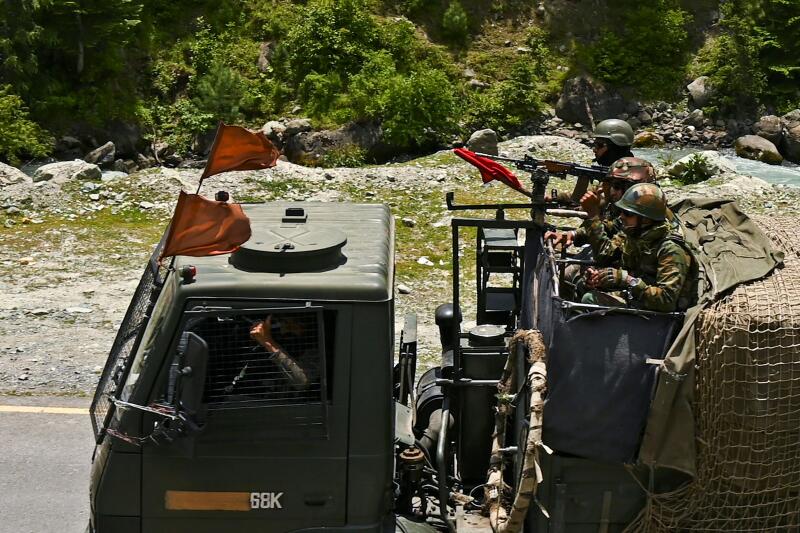Reports say India changed rules of the game along disputed border with China
Sign up now: Get insights on Asia's fast-moving developments

New Delhi is said to have allowed its soldiers to open fire, if necessary, in extraordinary circumstances.
PHOTO: AFP
NEW DELHI - The Indian government is reported to have amended the rules of engagement for its troops along the disputed border with China in the Himalayan region a week after the most violent clash between the two since they fought a brief border war in 1962.
New Delhi is said to have allowed its soldiers to open fire, if necessary, in extraordinary circumstances.
Previously troops adhered strictly to a 1996 agreement on "Confidence Building Measures in the military field", which governs military behaviour between the two sides. The agreement stated that neither side should open fire within 2km of the Line of Actual Control (LAC), the de-facto border in the disputed region.
The Indian media has dubbed the latest move as "new rules of engagement".
Defence Minister Rajnath Singh gave the go-ahead during a review of the border situation with Chief of Defence Staff General Bipin Rawat and the chiefs of the three armed services on Sunday (June 21).
Sources said it was aimed at giving greater clarity to commanders on the ground following the violent clashes in the Galwan Valley on June 15 which left 20 Indian soldiers and an unknown number of Chinese troops dead.
"There will be no more burden of CBMs (Confidence Building Measures) on Indian soldiers," a source told The Straits Times.
Talks were continuing on Monday between the two sides to resolve the border stand-off in the Galwan Valley and elsewhere along the LAC
Several areas along the undemarcated border or the LAC is disputed even though it has remained largely peaceful for the past 45 years. In 1975, four Indian soldiers were killed at Tulung La in Arunachal Pradesh.
The current row erupted last month after India accused China of changing the status quo in the region and moving troops into forward positions in Galwan Valley and elsewhere.
Analysts say New Delhi by unilaterally changing the CBM was trying to assuage domestic concerns about the safety of Indian soldiers and better managing the border.
Questions have been raised over why the soldiers had to follow protocol when their lives were in danger. Opposition Congress leader Rahul Gandhi asked if those who lost their lives were sent unarmed.
External affairs minister S Jaishankar responded by saying that all troops on border duty were always armed but had to follow the CBM.
"Those at Galwan on 15 June did so. Longstanding practice (as per 1996 and 2005 agreements) not to use firearms during face-offs," the minister tweeted.
In 2005, the two countries reiterated their commitment to the 1996 agreement.
Prime Minister Narendra Modi has also faced criticism from the opposition Congress and others for not giving a clear picture of the developments along the border, a charge dismissed by his ruling Bharatiya Janata Party and government.
"It's a case of saying earlier protocols are being reviewed and made flexible to deal with the post-Galwan situation... Because domestically, there is a lot of criticism," said Mr C Uday Bhaskar, director of the Society of Policy Studies.
Referring to the reported change in posture, Prof Bharat Karnad at the Centre for Policy Research said: "It signifies a change in field tactics and the 'rules of engagement' that earlier tilted towards avoiding violence. China's 'shock' attack on the Galwan River means in future encounters, Indian jawans (soldiers), similarly armed for combat at close quarters, may surprise the PLA (People's Liberation Army)."
Defence analyst Abhijnan Rej believed New Delhi's latest move also served strategic purposes.
"This is the largest strategic signalling from New Delhi to Beijing that India is willing to run the risk of escalation.
"By allowing local troops to use firearms, Delhi seems to be saying we are not afraid of the situation," he said.
China has so far not responded to the move.
But Global Times editor Hu Xijin warned India against violating the CBM.
"If Indian soldiers use firearms against Chinese soldiers in the future, there will be a different picture in the border areas," he wrote in an editorial in the paper published by Chinese Communist Party mouthpiece People's Daily.
"I must warn Indian nationalists: If your soldiers cannot even defeat Chinese soldiers in unarmed clashes, then guns and other firearms will not help them."
Neither side has thus far claimed victory in the violent clash last week.


